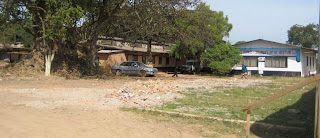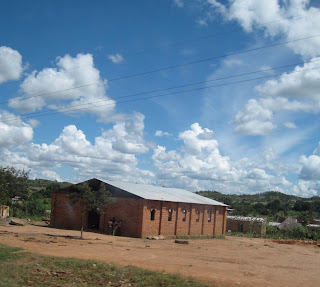Saturday, 30 April 2011
The Catholic Church in downtown Lubumbashi. Last week for Easter it was the scene of colorful festivities with mostly women dressed in bright Congolese dresses carrying rosaries. Tomorrow is May 1st, International Workers' Day. Despite the high unemployment rate, the celebration will be postponed until Monday. All the stores will be closed. There will be parades. Banks closed early on Friday making it difficult for Elder Wilson (the mission financial clerk) to supply all the missionaries with their "soutien", their monthly living expenses. There are no ATM's in the Congo so missionaries are given cash each month, usually a $100 American bill with the rest in smaller $ and Congolese francs. There are money changers on almost every corner.
This morning I woke up to the sound of Christians singing somewhere in the neighborhood. That was at 5:20 a.m., before the sky started turning red at about 6 a.m. This is indeed a Christian country.
This is the largest store in Lubumbashi: Jumbo Mart. It is an Indian owned company with about half the employees from India. The second and third largest stores are also Indian owned. First floor: food and kitchen; second floor: electronics, bedding, and clothing; third floor: furnishings. That open place in front of the gray SUV will be our parking spot, a nice one. Usually we have to hop a 4 inch curb with our 4-wheel drive Toyota HiLux truck.
On the way to the University of Lubumbashi. About a week ago the student president of the Economics English Club attended our English class at the Lubumbashi Stake Center. He invited us to speak at his club, wanting us to tell the 100 members why we were in the Congo and a little bit about our church. We were more than happy to comply and after bearing our testimonies, handing out Restoration pamphlets, and collecting referral slips, we met the Dean of Faculty. We now have a dinner appointment with university officials to discuss the possibility of supplying the university with 2 English teachers, much like the Kennedy Center at BYU supplies teachers to Chinese universities. Everything looks good for starting in October. A new couple is coming in August. President Packer will also try to recruit another couple. Are you interested?
This is one of the student dorms. There are 18,000 students at the University of Lubumbashi. The ones we spoke to were extremely polite and interested. If we weren't transferring to Mbjui-Mayi is a few weeks, Ann and I would very much enjoy teaching conversational English. What an opportunity to influence business and economic students and help the Congo to progress!
This picture is out of sequence. To the extreme right is a machine gun nest. Ann was unaware that she shouldn't be taking pictures next to the President of the Congo's southern residence. There is a little fruit and vegetable stand at the bottom of this street. We live in the upper right corner of the photo about half a mile away.
The pavement ends on the left at the dirt entrance to the university. The sign on the right says: UNLUM, University of Lubumbashi.
This is the basketball court.
This is the office of the Department of Economics. Plenty of parking to the right.
These are the classrooms and lecture hall. We spoke in the building to the right instead of the usual classroom because of testing.
This is the administration building of the university, the tallest building in Lubumbashi at 7 floors. It is vintage 1960 when the UN had its first African mission. It was a hospital. The bus on the left shuttles faculty between campuses.
Admittedly the campus doesn't compare to a UofU or BYU, but there are bright young, friendly minds there. A great opportunity to make a real difference in a struggling country. Let me know if you'd like to spend 18 months teaching English.
Our passports are in Kinshasa (with the required fees and photos) to extend our visas. May 15th is the target date to take occupancy of our district office/home in Mbjui-Mayi. The president will fly our truck and furnishings to Mbjui-Mayi. We will follow when the landlord finishes the renovations he promised (he hasn't done a thing yet) and our visas are returned. Of additional interest is the fact that I (Elder Moore) was just set apart of the 3rd mission counselor to the Mission President. With priesthood keys my role in Mbjui-Mayi will broaden considerably. No longer only "member support" but now priesthood line of authority. President Packer asked three times for a 3rd counselor. It required First Presidency approval. It's nice to have one's name discussed in Celestial Circles.





















































